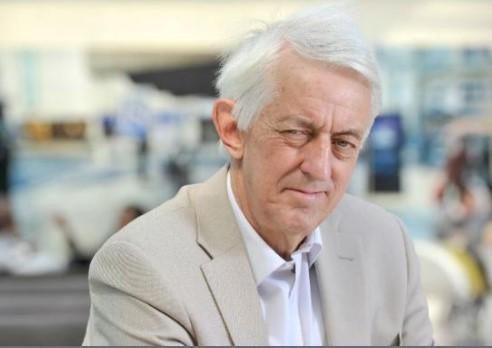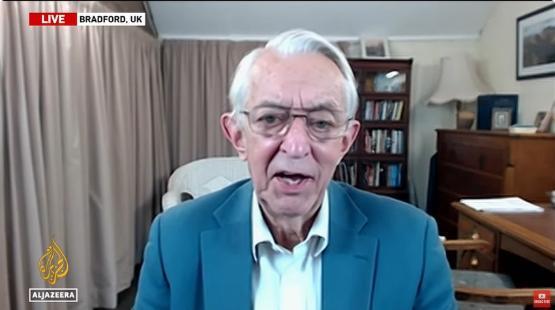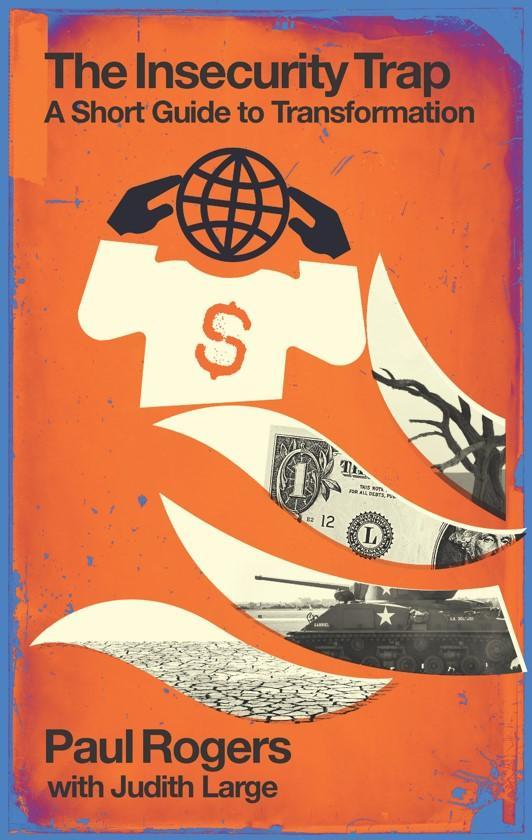War, climate change and the economy and how to fix them
International security expert Emeritus Professor Paul Rogers from the University of Bradford says the Government could solve much of its financial “black hole” with a modest 2% wealth tax on the super rich or by scrapping the Trident nuclear submarine programme.

Professor Rogers dubs the UK’s Trident nuclear submarine programme a “delusion of post-imperial grandeur” and says its £200bn lifetime cost is a huge waste of money.
He also calls on the Government to prioritise climate change issues.

Professor Rogers, pictured above being interview on Aljazeera earlier this week, makes the arguments in his new book, The Insecurity Trap - A Short Guide to Transformation (Hawthorn Press), which is out on Monday September 23.
Professor Rogers is author of bestselling book Losing Control: Global Security in the Twenty-first Century, which predicted 9/11, the US ‘War on Terror’ and the dire consequences that followed.
He said: “The Insecurity Trap looks at the current mix of global tensions, set against a backdrop of climate crisis and an economic system that is failing miserably, and asks what can ordinary people do about it?
“We have an extraordinary tax system here in the UK in which you get almost obscene levels of wealth developing. How can one person be worth tens of billions of pounds? There's something very seriously wrong there.
“We also look at nuclear weapons. For Britain, nuclear weapons are a delusion of post-imperial grandeur. They have been from the start. If we ever did use them, depending on where we aimed them, they have the potential to kill about 20 million people in about an hour-and-a-half - is that the sign of a civilised society?”

Judith Large, senior research fellow at the University of Kent’s Conflict Analysis Research Centre, who wrote the foreword and Action Guide section of the book, said: “Today's fast spinning news cycles plus disinformation contribute to feelings of insecurity and disempowerment, often leading in turn to angry division and projected rage. Paul Rogers presents a big picture analysis in which we can better see our part in the whole and take proactive steps towards positive change.”
Guide to transformation
The book brings together the three challenges of the climate crisis, an unjust economic system and a reliance on military solutions to complex human problems, and asks:
-
Can we prevent climate breakdown?
-
Can we transform the world economy to a fairer system?
-
Can we avoid the early use of military force in responses to international crises?
The book not only offers in-depth analysis but also advice on what ordinary citizens can do to help bring about change, from joining pressure groups and becoming better informed to sourcing food locally and helping tackle homelessness.
Professor Rogers added: “The Government is embarking on a review of Britain’s defence strategy but unless it focuses on issues such as climate breakdown and the global economic divide it won’t be worth the paper it is written on.
“When we hear about the various crises around the world on the news, they are very often accompanied by a sense of helplessness. What this book aims to do is to look at these vexatious issues and, in a way, offer some hope to people, to show them ways in which we can all make a difference by helping to bring about peaceful change.”
An ideal war is one in which it is possible to arm both sides, that lasts a long time and does not directly involve militaries of the country providing the armaments… The world’s military complexes need arms races and wars in order to thrive and such complexes are rooted in the current economic system.

Book excerpts
Taxing the super-rich
“In May 2023, three UK-based NGOs - Tax Justice UK, the Economic Exchange Unit and the New Economics Foundation - assessed what sort of revenue would be raised from a modest 2% wealth tax on the UK’s 350 richest families, the tax being on assets greater than £10 billion. It came to £22 billion each year. Given the rate at which these families’ wealth was accumulating, for most of them there might not be any net loss; they just wouldn’t get richer at quite the rate they had been doing before. Such is the nature of the world’s crazy monetary system.”
The 1% elite
“Of the global population of eight billion, perhaps six billion are marginalised, two billion get by okay, a couple of hundred million are doing nicely, while just 1% are doing very well indeed and a million or so people are really coining it in. In 2024, the world’s five richest people (all men) doubled their fortunes to US$869 billion, while over the same period, the world’s poorest 60%, just short of five billion people, actually lost money.”

Migration
“One of the well-nigh certain effects of climate breakdown will be huge increases in migration as desperate people try to move to safer places. There has already been an increase in such movements… because of war, persecution and poverty. Some assessments suggest the increase in migration could be up to tenfold what is being experienced at present.”
Industrial-military-complex
“To put it crudely, a military system at its worst may be described as a ‘war-promoting hydra’. When it comes to the profitability of armaments production… an ideal war is one in which it is possible to arm both sides, that lasts a long time and does not directly involve militaries of the country providing the armaments… The world’s military complexes need arms races and wars in order to thrive and such complexes are rooted in the current economic system.
“The UK, as a middle power, still riddled with pretensions of greatness, has a security complex… made up of the military, civil service, and corporations, the latter comprising arms manufacturers and private military companies and intelligence outfits, who see their role as defenders of the realm. Within the complex, there is continual interchange. Military officers are seconded to corporations, as are senior civil servants, and there is movement the other way. In the UK, the Rethinking Security group identifies this culture as thoroughly outmoded…”
Climate change
“In the early 2030s but quite possibly sooner, the proverbial will hit the fan. Catastrophe will directly affect some of the richest states; for example, a sudden intense heat dome may affect a major city and kill many thousands within a couple of days. There may be a Category Six hurricane affecting a city in Europe.”

Arms control
“We should de-alert the Trident nuclear system, join the UN Nuclear Weapons Convention and proceed to a non-nuclear military posture (saving well over £200 billion over the lifetime of the Trident system).”
Testimonial
Anthony Barnett, co-founder and former editor of openDemocracy, said: “Few if any prophets have been so calm, steady and thoroughly vindicated as Paul Rogers. At the time he warned that if the USA invaded Iraq it would initiate a disastrous thirty-year war that would spread out across the Middle East and suck America to defeat. And here we are, only two-thirds of the way through. Equally, he emphasised at the start of the century the twin dangers of climate change and hi-tech bellicosity. Free from florid rhetoric, incredibly patient and rooted in careful research, he needs to be read and listened to. Now in this lucid overview of the current ‘polycrisis’ he sets out what can be done before it is too late.”
The Insecurity Trap - A Short Guide to Transformation is published by Hawthorne Press, available in paperback priced £11.99 from Monday September 23. There will be a book launch and talk on Friday, 15 November, from 7.30pm at Lansdown Hall, Stroud, tickets £10 (£5 concessions).
